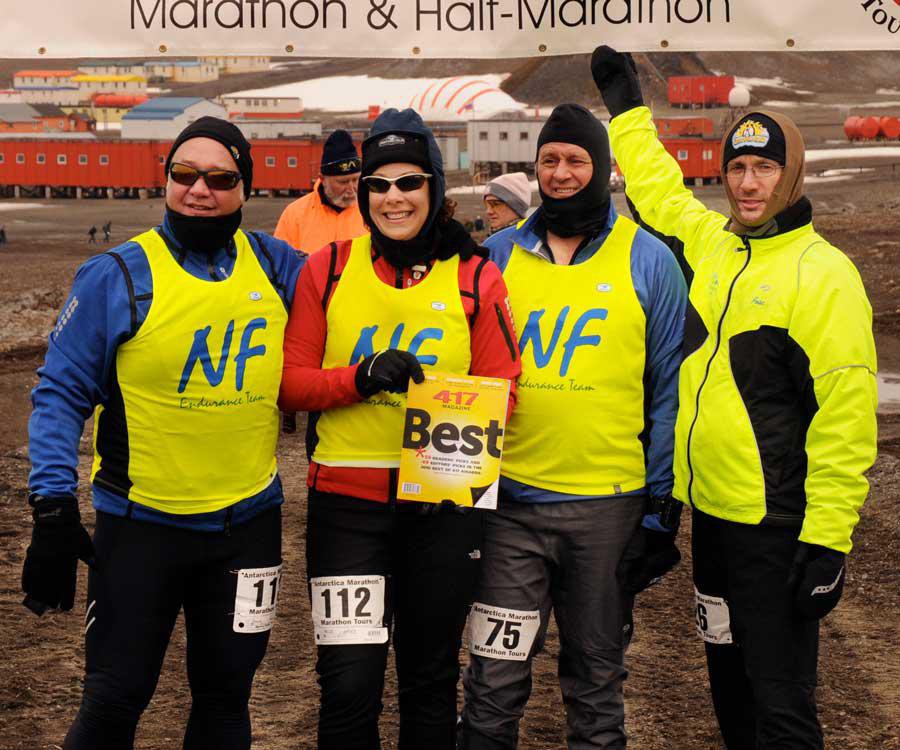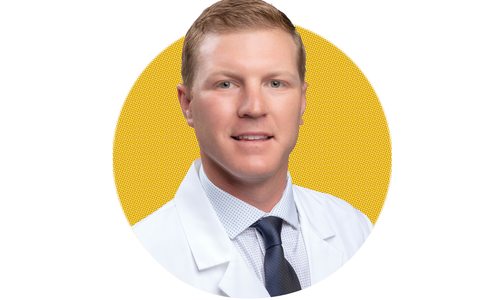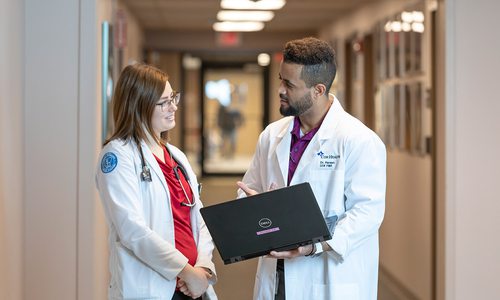Life
Surgeons Running the Globe
We sat down to talk all things running with Dr. Jose Dominguez and Dr. John Steinberg, two CoxHealth surgeons who are nearing their goal of running a marathon on every continent.
Written by Savannah Waszczuk | Photos courtesy Jose Dominguez, John Steinberg
May 2017

Dr. John Steinberg and Dr. Jose Dominguez have run marathons all over the world, including Antarctica.
In 2001, Dr. Jose Dominguez’s son was diagnosed with neurofibromatosis. That same year, a neurofibromatosis foundation held a benefit marathon for the disease in St. Louis. “I wasn’t really a runner, per se, but I thought it sounded like a good idea, so I went ahead and trained for it,” says Dominguez, a general and colorectal surgeon at CoxHealth. He continued running over the years, eventually having Dr. John Steinberg, a cardiothoracic surgeon who also works at CoxHealth, join him at the starting line of his first overseas marathon in Antarctica.
After running that race in 2010, the doctor duo agreed to yet another goal: running a marathon on every continent. And although they have been joined by a couple of other doctors along the way, it’s Dominguez and Steinberg who have almost finished the feat. “I’ve now run on five continents, and Dr. Steinberg has run six,” Dominguez says. On May 20 of 2017, the two will run the Great Wall Marathon in China, where Steinberg will complete his seventh continent race and Dominguez will check off number six. We talked with them about their training, the challenge and their fun and friendly competition.

Dr. Dominguez’s and his son Eric on Easter Island. Eric has neurofibromatosis, and Dominguez’s first foray into racing was to benefit a neurofibromatosis foundation.
Dr. Jose Dominguez
417 Magazine: How many marathons have you run now?
J.D.: I’ve run 28 marathons. Steinberg has run 30.
417: Who’s faster?
J.D.: Steinberg is faster. He’s always faster. This is what happens at the end of a marathon. He usually finishes the marathon at least an hour before me. Maybe even an hour and 20 minutes. He will come back, he will shower, and he will be drinking a glass of wine when I show up. And it’s annoying. Very annoying.
417: How much did you train?
J.D.: The marathon I trained for the most was the first one in St. Louis because I didn’t know if I could do it. I probably trained six months pretty hard for that. And then I ran that and knew I could do it, so I don’t train as hard now. I run 5 to 8 miles three or four times a week, just kind of baseline. Then when a marathon is coming up, I train pretty hard for three or four months. I just pick up my running and long runs on the weekend. About two weeks before the marathon I like to run a 20-mile run, and that’s as far as I go on the training runs.
417: How do the marathons differ from continent to continent?
J.D.: The first continent we did was Antarctica, and it was Antarctica’s summer, which was in March. It was probably 20 degrees with a wind chill. It was very cold, and it was running in snow and slush and ice and up and down some hills. We’ve also run in Kenya, and that was the complete opposite. It was probably 80 or 90 degrees, dusty and hot. We just ran last year in November in Queenstown, New Zealand. It was pretty hilly, and the weather was nice, 60 to 70 degrees. It was beautiful. For South America, we ran on Easter Island. That was a hilly, tropical kind of warm place. But I’d say Antarctica was the most beautiful, and New Zealand was a very close second. Antarctica is just a very special place. It’s great to have gotten to see it. It’s amazing.
417: Have you run many marathons locally?
J.D.: I’ve done the Bass Pro [Conservation] Marathon and the Run for the Ranch marathon. I try not to do multiple marathons in one state, because we’re also trying to do all of the states now, and my body only has a certain amount of marathons in it, and I don’t know how many that is.

Dr. John Steinberg running in New Zealand.
Dr. John Steinberg
417: You and Dr. Dominguez have a friendly competition with these marathons. Would you like to say anything about that?
J.S.: You might want to point out that when we did Antarctica, I finished the marathon. I got taken back to the ship. I took a shower. I had stretched. I had drunk two cups of hot chocolate, and I was on my second glass of wine before Dominguez showed up. I’m just saying.
417: Yes, Dr. Dominguez did mention that, but he still likes the competition. How about you?
J.S.: Yeah—well, I’m sure he told you about the time that some women thought that I was his father because I look so much older than him. We were in Vermont, and we were talking to these women, then they asked him later where his dad was. But his dad was waiting for him at the finish line. But really, with anything we do—at work we’re that way, too—we kind of just egg each other on. But it’s nothing serious. I know that he’s always there for me, and I’m always there for him.
417: Doctors are known for having busy schedules. How do you have the time to train?
J.S.: I just do. A lot of times I run or do whatever other workout late at night. I could be running at 10 or 11 at night. It’s easier now that my kids are out of the house—they’re in college and medical school—so I have more time there. You just have to make it happen. You have to make it a priority.
417: What advice would you give to a new runner considering a marathon?
J.S.: Start out slow, and don’t get discouraged. Start out with 5Ks and 10Ks and halves and then marathons. You just have to be consistent, and you can’t compete with anyone else other than yourself. Don’t worry about someone else if they’re going faster than you or slower than you. You just do your own thing and try to enjoy it and mix it up with other things, too, so you don’t get bored with it.
417: Besides exercise and travel, is there anything else you get from running marathons?
J.S.: Every time we go to these places we meet someone. There are all these crazy people that put forth this effort to do this, and we’re all Type A. But everyone kind of has these same experiences, and different runners are all doing it for different reasons. You’ll just be running along for 26.2 miles, and all of a sudden you’re having a conversation with someone for five miles. Then the next five miles you’re talking to someone else. So you meet all these different people, and occasionally you’ll start seeing them at different marathons. Now there’s this big thing about getting marathons in all 50 states, so a lot of people are working on that, so you’ll see them somewhere else again. That’s fun, too. I am attempting to run in all 50 states now. I have completed 26.











